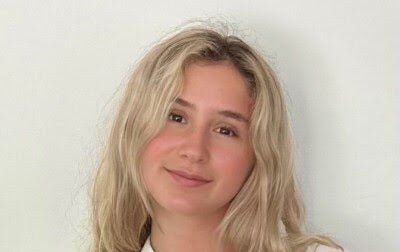JUPS Senior (C’25) Wins Prestigious Rhodes Scholarship

JUPS senior Noa Offman (C’25) has been awarded the Rhodes Scholarship, a fully-funded postgraduate award that allows young people from across the world to study at the University of Oxford.
What drew you towards criminal justice reform? And how does the Rhodes Scholarship fit in with your long-term career goals? I was actually supposed to be a doctor. I came to Georgetown as a global health major.
During my first semester freshman year, I enrolled in the mandatory “Problem of God” class. One Wednesday, near the end of the semester, we were surprised by a guest lecturer: Colie Levar Long, a 45-year-old serving a life sentence without parole for a crime he committed at 18. His face appeared projected on the classroom wall as he joined us via Zoom from the DC Jail. Despite his dreary grey surroundings, he beamed.
With striking clarity, he described the brutal realities of life behind bars—conditions that broke even the most hardened individuals. As a child, he was reduced to a number, subjected to solitary confinement for minor infractions, and endured unrelenting physical and emotional abuse from guards. His story painted a harrowing picture of a system designed not to rehabilitate, but to break. It struck me that at the time of his sentencing, he was younger than I was.
That one conversation changed everything. I changed my major from Global Health to Justice and Peace, vowing to become a prisoners’ rights lawyer.
The Rhodes Scholarship offers me a chance to expand my perspective beyond the often narrow, domestic lens of U.S. criminal justice reform. At Oxford, I have the privilege of learning from leading criminologists who are pioneering a more humane British carceral system, demonstrating how even punitive systems can evolve. Engaging in international dialogue will shape my pursuit of reform upon my return to the U.S.
What is your most memorable experience from the Justice and Peace Studies Program? One of my most memorable experiences was my Introduction to JUPS course with Dr. Atashi. A unit on the prison industrial complex challenged us to critically examine the tension between reform and abolition. I was struck by the rarity of questioning systems we are so often conditioned to see as inevitable—especially in an academic setting. The course fostered a resistance to complacency that resonated deeply with me. I knew I was in the right place.
Another highlight was my one-credit Restorative Justice course with Tarek Maassarani, which shaped what I consider to be my greatest strength: radical empathy. The concepts and practices we explored inspired my involvement in the formation of Restorative Georgetown, solidifying my commitment to embedding humanity within responses to harm.
What would you say to current undergraduates considering a JUPS major, minor, or certificate? JUPS bridges the gap between understanding injustice and doing something about it. It epitomizes education as a catalyst for change. The culture of care that defines JUPS is transformative and contagious. To be part of this program is to join a community of peers and faculty equally committed to the pursuit of justice and peace and I feel profoundly grateful to have been part of it.
What are you most looking forward to at Oxford? Where to begin? First, I am so excited to continue to be surrounded by and learn from brilliant, ambitious people. On a more personal note, I’ve never been to Oxford before, and from what I’ve seen in my many Google searches, the campus looks like something out of a dream—basically my childhood Hogwarts fantasy come to life. I can’t wait to see it all in person and experience it for myself. It’s going to be incredible.
